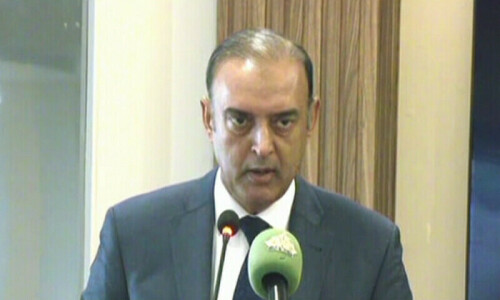
DHAKA: Blindfolded, handcuffed and bundled out of his secret prison for the first time in eight years, Bangladeshi barrister Ahmad Bin Quasem held his breath and listened for the sound of a cocked pistol.
Instead, he was tossed from a car and into a muddy ditch on Dhaka’s outskirts — alive, at liberty, and with no knowledge of the national upheaval that had prompted his abrupt release.
“That’s the first time I got fresh air in eight years,” Quasem, 40, said. “I thought they were going to kill me.”
Sheikh Hasina, the premier responsible for Quasem’s abduction and disappearance, had fled the country earlier. Her August 5 departure brought a sudden curtain down on 15 years of autocracy that included the mass detention and extrajudicial killing of her political opponents.
But Quasem was in the dark. He had been confined in the “House of Mirrors” (Aynaghar), a facility run by army intelligence, given its name because its detainees were never supposed to see any other person besides themselves.
Throughout his long incarceration, Quasem was shackled around the clock in windowless solitary confinement. His jailers were under strict instruction not to relay news from the outside world.
‘Screaming’
Elsewhere in the detention centre, guards blared music throughout the day that drowned out Azan — the Islamic call to prayer — from nearby mosques.
It prevented Quasem, a devout Muslim, from knowing when he should offer his prayers — and from keeping track of how long had elapsed since his abduction. When the music was off, he heard the anguished sounds of other detainees.
“Slowly, slowly, I could realise that I am not alone,” he said. “I could hear people crying, I could hear people being tortured, I could hear people screaming.”
He is certain of the reason for his abduction. His father, Mir Quasem Ali, a senior member of Jamaat-i-Islami was on trial that year. Ali was accused of running a paramilitary group. Whether or not Ali was guilty, there was no way of knowing from the mockery of justice that accompanied his prosecution.
Quasem, called to the bar in London and then aged 32, was running his father’s defence. His regular media briefings on procedural lapses and judicial bias at the tribunal, echoed by rights groups and UN experts, put a target on his back.
Plainclothes men entered his house one night, snatched him from his family, dragged him down the stairs and threw him in a waiting car. “I never could believe in my wildest dreams that they would subject me to disappearance just days before my father’s execution,” Quasem said.
Quasem’s father was hanged four weeks later. He did not know until about three more years had passed when one of his jailers accidentally let it slip.
Published in Dawn, August 15th, 2024













































Dear visitor, the comments section is undergoing an overhaul and will return soon.